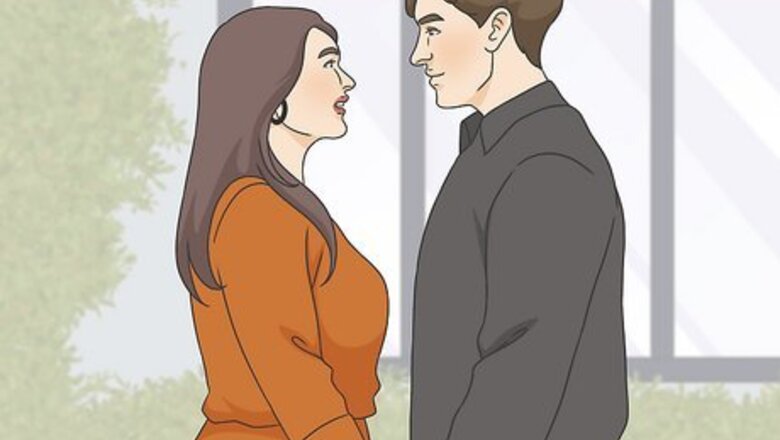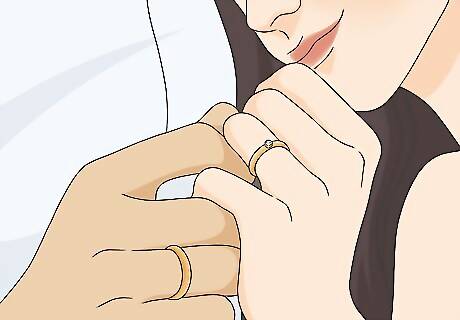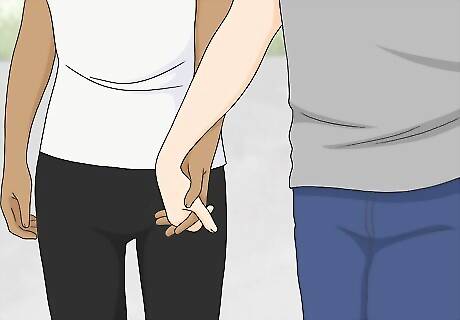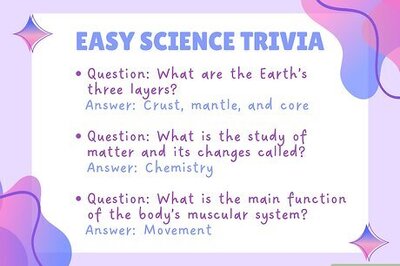
views
- Relationship status is what you tell people when they ask, “Are you in a relationship?”
- Common relationship statuses include casually dating, partners, friends with benefits, and single.
- Identify your relationship status by analyzing your and your partner’s commitment and whether you’re exclusively intimate.
What is a relationship status?

A relationship status is how you categorize a romantic relationship with another person. In order words, your relationship status is whether or not you call a crush or significant other your partner, boyfriend, or girlfriend. It’s what you tell other people when they ask, “Are you dating?” or “Are you in a relationship?” Your status can change over time with your relationship—starting as “just talking” and moving towards being an item. Your relationship status doesn’t even have to involve an SO! If you define yourself as single, that’s your relationship status. If you consider yourself in an open relationship, that can also be your status.
Type of Relationship Statuses

Talking or hanging out If you’re simply “talking” or “hanging out” with someone, you likely have a huge crush on them. You can see yourselves as a couple, but you haven’t gone further than sending a few flirty texts or exchanging a heat-full glance here or there. It’s the early stages of a budding relationship—nothing’s set in stone—you just have eyes for each other!

Casually dating You probably like this person a lot if you’re casually dating. While you may not be ready to call them yours, you want to learn more about them. Perhaps you text each other flirty jokes and meet up on the weekend—you may have even shared a kiss! You’re not an item yet, and you can walk away whenever you’d like. You’re just “seeing each other,” after all.

Partners If you call your significant other your partner, boyfriend, or girlfriend, you’re likely in a committed relationship. It’s clear that you both have eyes only for each other—you’re exclusive! You likely don’t have to worry about them sneaking off with someone else because they’re your boo and your boo only. You want to be in a relationship together; there’s no question about it.

Engaged You’re likely head over heels for your special someone. They’ve likely knelt down and asked for your hand in marriage, or you swallowed your nerves and asked them the important question. Either way, you’re soon to be married! When someone asks about your relationship, you talk about your significant other as “fiance” or “fiancee.”

Married If you’re married, you’re significant other put a ring on it! You’re their lifelong partner; they’re husband or wife. You’ve vowed to be there for each other through sickness and health and for richer or poor—you love them unconditionally! In other words, they’re legally you’re ride or die.

Friends with benefits If you’re in a friends-with-benefits relationship, there’s likely only hot chemistry between you and a good friend. Basically, they’re your booty call! You probably don’t have romantic feelings for one another, but the physical chemistry is out of this world. There’s no commitment or emotional connection (ideally), just good vibes. FWB relationships can be tricky to navigate, especially if one party develops an emotional or romantic connection with the other.

Open relationship Open relationships are exactly how they sound: open! You have an emotional, romantic, and physical connection with your partner, but you’re able to be romantically or physically involved with other people. You’re committed to your partner but likely have other sexual partners to fit your needs. Open relationships are the most successful when both parties share the same sexual preferences and relationship goals. Polyamory relationships are very similar to open relationships, as there's more than 1 sexual partner involved; however, polyamory focuses on maintaining emotional intimacy and commitment with all partners.

Single If you’re single, you may be ready to mingle or not. You’re not in a relationship. Perhaps you just got out of one, or you’ve never been in one. Either way, you’re embracing the single life. You might be actively looking for a relationship or are simply waiting for whatever comes your way.
How to Assess Your Relationship Status

Are you committed to one another? How committed you are to your partner and the relationship is an excellent way to assess your relationship status. Commitment is a conscious choice to have someone be a part of your life and future. So, have you talked about the future with your SO? Do you have a dedicated bathroom drawer at their place? If so, an exclusive relationship may be forming.

How long have you been together? The length of your relationship can say a lot about your relationship status. Say you’ve only known them for a few days, and your interactions are exclusively over text. Then, you might be in the talking stage. Perhaps you’ve been friends forever but hook up randomly one night and can’t stop thinking about them. In this instance, you may be in a friends-with-benefits situation.

Are you involved in their life? If you’ve met their friends and family, chances are you’re special to them. This is a good sign that they’re thinking of spending a lot of time with you and see you as a partner in the near future. More often than not, friends with benefits or people talking to one another won’t share detailed information about their lives because they don’t see the relationship as exclusive.

How do they talk about the relationship? Pay attention to what your SO says about you and your relationship. When asked, do they say their relationship with you is “complicated,” “serious,” or “open”? A positive response usually indicates a hope to start or continue dating, whereas a negative response may be a sign of something ending. Similarly, think about how you describe the relationship to friends and family. The first word that comes to mind is usually very telling of your feelings.

Do you have public displays of affection? PDA can be a telling sign of what your relationship status is. If you and your partner always hold hands, hug, and/or kiss in public, chances are you’re in a committed relationship. If physical intimacy is kept behind closed doors, you might be in the early stages of a relationship or a friends-with-benefits situation. Keep in mind that PDA is unique for everyone. You might feel comfortable holding hands with someone you’re not exclusive with. It all depends on the individual.

Have you talked to your SO about your relationship? At the end of the day, if you’re unsure what your status is with your SO, ask them about it. Making sure you’re both on the same page about your relationship is a great way to know where you stand with each other. Plus, this way, you can both update your social media profiles accordingly. Try saying something like, “We’ve been seeing each other for a while now. Are we boyfriend and girlfriend?” or “I love hanging out with you, but I don’t think I’m ready for an emotional relationship. What do you think? How do you see us in the future?”
What is relationship status discrimination?

Relationship status discrimination is when someone is unjustly treated because of their relationship. Anyone can experience relationship status discrimination at any time in any place. More often than not, people experience this biased and prejudicial treatment when their type of relationship is revealed, especially if it’s a status with a negative reputation (such as friends with benefits or polyamory). For example, if a couple is denied an application to rent a home together because they’re not legally married, that’s relationship status discrimination. Similarly, if a landlord doesn’t rent a home to a group of friends who aren’t in committed relationships, that’s discrimination. Along with this, it’s discrimination if services of any kind are denied if an individual denies giving up details about their relationship status—the status of your relationship is no one’s business but your own.




















Comments
0 comment